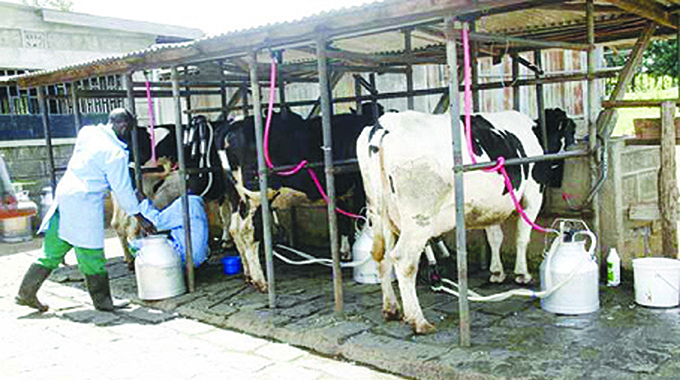Dairy sector takes positive steps

Precious Manomano Herald Reporter
Growth of the livestock sector is critical in achieving food security, providing raw materials for further processing and promoting sustainable agriculture in line with Vision 2030 of an empowered upper middle class society.
The livestock growth plan is part of the agriculture food systems transformation strategy, which seeks to achieve an US$8,2 billion agriculture economy by 2025.
The Government has put in place measures to address animal health such as the January Disease outbreak, and that has seen intensive dipping and toll manufacturing of dip chemicals.
Speaking during World Milk Day commemorations in Harare last Friday, Director of Veterinary Field Services in the Ministry of Lands, Agriculture, Fisheries, Water and Rural Development, Dr Jairus Machakwa, said Zimbabwe was making strides towards Vision 2030, improving agriculture production, productivity and profitability for the attainment of national and household level food and nutrition security.
The World Milk Day commemorations were held under the theme: “Dairy Net Zero”.
Zimbabwe had taken a proactive approach by distributing seed for fodder crops that include lablab, sun hemp and velvet beans and the Ministry was training farmers under the Presidential Pasture Production Scheme to promote the production of fodder by over 500 000 rural households.
“Milk is an important part of a healthy balanced diet, and this World Milk Day provides the perfect opportunity to spread the word.
“As much as milk is beneficial, it is crucial that the production, processing, and consumption chain is done in a way that protects, maintains and improves our environment.
“I am very happy that this year’s theme for the celebrations is anchored on ensuring sustainable economic practices that help preserve our environment for future generations.
“On behalf of Government, I would want to state that we are committed to the sustainable development of the livestock sector,” said Dr Machakwa.
All farmers were encouraged to comply with animal movement regulations and not move cattle, pigs, goats and sheep without a permit issued by the Veterinary Department, as such animals would be destroyed and the farmers prosecuted.
Farmers had to produce all their cattle for dipping at each dipping session, and could be prosecuted if their animals were found infested with ticks.
“Apply tick grease onto your cattle in between dipping (sessions) or when you notice ticks.
“Sell off non-productive cattle and manage your livestock farming as a business,” said Dr Machakwa.
The signing of the Dairy Declaration of Rotterdam in 2016 by representatives of the global dairy community, demonstrates the commitment of the sector towards sustainable development.
In line with the first pillar of the Comprehensive Africa Agriculture Development Programme, dairy farmers are committed to producing nutrient-rich milk on their dairy farms for consumers to enjoy a healthy lifestyle.
In 2001, World Milk Day was established by the Food and Agriculture Organisation to recognise the importance of milk as a global food, and to celebrate the dairy sector.
Since then, the benefits of milk and dairy products have been actively promoted around the world, including how dairy supports the livelihoods of one billion people.








Comments